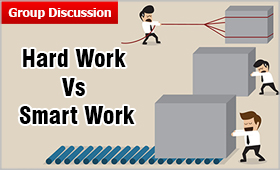
The debate between hard work and smart work has gained prominence in the modern professional world. Narayana Murthy, the co-founder of Infosys, sparked debate by recommending a 70-hour workweek for young Indians to boost productivity. He implied that hard work is key to success. While hard work is associated with diligence and effort, smart work is seen as an efficient, intelligent way of achieving results with optimal use of resources. Given the importance, this is a hot topic for Group Discussion round in MBA admission process and other selections. Read this solved GD Topic by MBAUniverse.com.
Hard Work vs Smart Work: Definition & Meaning
Let’s start by understanding what these words mean.
Hard Work can be defined as persistent efforts, often involving long hours, repetition, and thorough execution. It reflects discipline, endurance, and commitment to completing a task.
On the other hand, smart work is associated with using strategies and tools to achieve goals more efficiently. It involves critical thinking, planning, and innovation.
Arguments in Favor of Hard Work
"There is no substitute for hard work."
— Thomas Edison
Many studies have identified hard work as key to success for following reasons:
Arguments in Favor of Smart Work
"Don’t work harder, work smarter."
— Allan F. Mogensen
Of late, social media is full of videos and tips that call for smart work to succeed for following reasons:
And, Not Or: Call for Balance
In reality, the question is not hard work vs smart work, but hard work plus smart work. These two attributes are complementary, not contradictory. The most successful individuals and organizations combine both. Hard work gives you depth and discipline; smart work brings agility and innovation.
Top Achievers Do Both Hard and Smart Work
Here is the success mantra of top achievers’ who preferred smart work to hard work
Conclusion
In conclusion, it can be said that hard work and smart work are not mutually exclusive, but they are two sides of the same coin. The ideal approach is to work hard in learning and building a foundation, and then work smart to optimize and innovate. The blend of both determines sustained success in today’s fast-paced world.
Also Check Latest Group Discussion GD Topics
Exam 2024 Notification